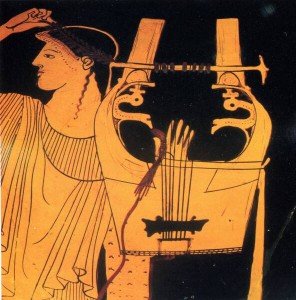Ancient Greek Music
 What did ancient Greek music sound like? Armand D’Angour, a classical musician and professor of history at the University of Oxford, has brought ancient Greek music back to life. A recent BBC article describes the conclusions of the professor’s research.
What did ancient Greek music sound like? Armand D’Angour, a classical musician and professor of history at the University of Oxford, has brought ancient Greek music back to life. A recent BBC article describes the conclusions of the professor’s research.
It is often forgotten that the writings at the root of Western literature, the epics of Homer, the love poems of Sappho, and the tragedies of Sophocles and Euripides were all, originally, music. Dating from around 750 to 400 BC, they were composed to be sung in whole or part to the accompaniment of the lyre, reed pipes, and percussion instruments,” said Professor D’Angour.
New discoveries about ancient Greek music come from the plethora of texts saved from that era. The texts are engraved with a phonetic notation devised around 450 BC which consists of alphabetical letters and signs placed over the vowels of the Greek words.
According to the article, the music tempo can be found in words and syllables. The musical instruments, known by various descriptions, paintings and archaeological findings enable us to recreate the depth and range of sounds they produced.
“While the documents, found etched in stone in Greece and papyrus in Egypt, have long been known to classicists, some were published as early as 1581 and in recent decades they have been augmented by new finds. Dating from around 300 BC to 300 AD, these fragments offer us a clearer view than ever before of the music of ancient Greece,” says Professor D’Angour.
However, he believes it is important to understand how the ancient tempos and melodies are completely different from ours. A whole musical piece was found engraved on a marble column dating around 200 AD. It is a short song of four lines, composed by Seikilos.
The full article and an audio reconstruction of the song composed by Seikilos can be found at this BBC link

